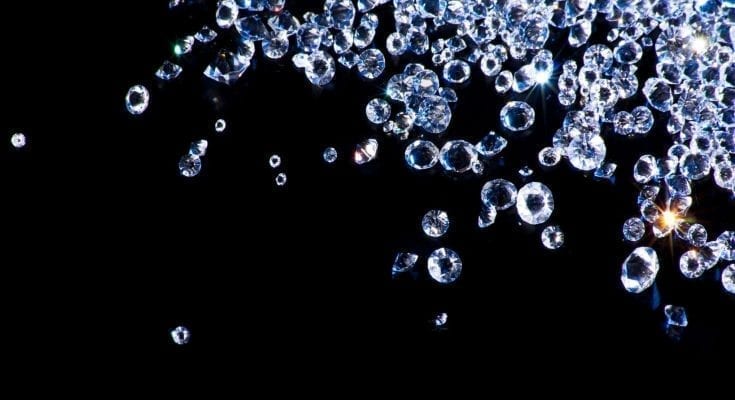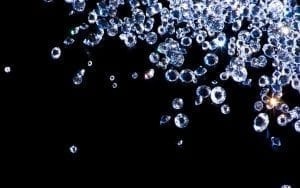Diamond Facts
The diamond is hardest natural rock on earth. This does not mean that it’s unbreakable or cannot be reduced in size. Diamonds can be reduced to simply nothing at very high temperatures. When a diamond is placed in a microwave and the temperature raised to 1405 degrees Fahrenheit or seven hundred and sixty three degrees Celsius it will simply disappear into thin air. Nothing will remain in the microwave but just carbon dioxide that has been produced in the process. Diamonds take a long time to be formed. They are formed within the earth’s crust for a period of over a billion years. It is formed at about 150 kilometers within the earth’s crust. They are then pushed to the surface of the earth by volcanoes. Diamonds are found within a volcanic rock that is commonly referred to as Kimberlite. Other diamonds can be found in the sea after they have been pushed there by the rivers. The diamond boasts of being 58 times harder than the second hardest mineral on earth which is the corundum which forms sapphires and rubies. People tried for many ways to cut the diamond using different tools to later discover that the only way that one can be able to cut the rock is by using another diamond. However, diamonds are brittle and will shatter when they are hit hard with a hammer.
Largest Diamond In The World
The largest diamond in the world is the Cullian. This rock was found in South Africa. When uncut, the rock weighed and amazing 3000 carats. It was so enormous it could leave you just SMH if we are TBH. Perfect for throwing up a GIF on Twitter or Instagram. It was later cut into the great star of Africa, lesser star of Africa and other diamonds. The cut diamonds weighed 530.2, 317.4 and 104 carats respectively. The smaller diamonds now form part of the crown jewels of the British. The Cullian boasts of being three times bigger than the second largest diamond in the world. The second largest diamond is known as the Excelsior. This rock was also found in South Africa.
Colored Diamonds
The largest polished diamond that was documented was the Unamed brown. The rock weighed 545 carats. It was cut down from a 700 carat rock. The masterpiece took three years to complete. Another diamond that took a similar length of time to complete is the centenary diamond that forms part of the British crown jewels. The centenary diamond boasts of being the largest flawless diamond and weighs 273.85 carats. It is a common assumption that all diamonds are white. This is not the case. Impurities give the diamonds a blue, orange, red, yellow, green or black shade. The rarest shade of diamonds would be the vivid blue, pink or green diamond. The diamonds do not bare the tag of being the rarest diamonds. The rarest mineral would be the red ruby. Diamonds are very common and can be found in plenty. Most of the diamonds that are mined cannot be used for jewelry. They are used to make cheap rings or in industries. People all over the world wear diamonds for jewelry, all the way from the glitz of Hollywood to Boston to Florida to Asia and Australia – even France.
There has also been the development of synthetic diamonds. They can be made by mixing lithium with paraffin and bone oil and then the mixture heated till its red hot in iron tubes. The scientists that came up with this process went by the name James Ballatyne Hannay. In our today world diamonds can also be made by crystallizing carbon under pressure. The business of selling synthesized diamonds is very big today. This is because the diamonds sell for less than the mined diamonds. One cannot even tell apart the mined diamonds from the synthetic diamonds. This also applies to the so called diamond experts. Diamonds are weighed differently from gold. The gold carat shows purity. One carat of diamond is 200 milligrams. This applies to both mined and synthetic diamonds. The term carat was derived from the carob bean. The beans were used by gem dealers to balance their scales as they would have the same weight. People tend to try and live vicariously through celebrities like Lizzo and Post Malone, and flashy jewelry shared on Facebook is one way of doing this.
Interesting Facts About Diamonds
Many might wonder what led to people wearing diamonds on their fourth finger. This custom was derived from the ancient Egyptians. They believed that the vein of love ran through the fourth finger and went straight to the heart. The mineral was given this name due to its characteristic of being hard. It came from the Greek word adamas. This word means unconquerable. When one mentions the word diamonds, the famous slogan, a diamond is forever, comes into mind. This slogan was created in the year 1947. It was a slogan that was used as a marketing strategy for diamond. The slogan was also voted as the best slogan in the 20th century.
Diamond Engagement Rings
Today diamonds are commonly used as engagement rings. This tradition was started by Archduke Maximillian who gave a ring to Mary of Burgundy. Then N.W Ayer was able to take advantage of this act and through clever marketing he was able to turn this gesture into a modern tradition. His marketing strategy was so clever that it’s still used to date to market the rocks.
Canada Yellow Diamond
In October of 2018, a 552-carat monster of a Yellow Diamond was discovered in Canada. It is the largest diamond discovery in North America.
Are Diamonds Rare?
Find out here some possible explanations.
[Entertainment] – Beyoncé wears $165 dress to Rihanna’s Diamond Ball, hits ‘Dear Evan Hansen’ afterward from USATODAYauto
Acoustic Cover of Rihanna’s "Diamonds" by Tereza from covers
Nature Facts: https://www.interestingfacts.org/category/nature-facts
World Facts: https://www.interestingfacts.org/category/world-facts
Science Facts: https://www.interestingfacts.org/category/science-facts
Definitions: https://www.interestingfacts.org/category/definition
Planets: https://www.interestingfacts.org/category/facts-about-planets
Nutrition Facts: https://www.interestingfacts.org/category/nutrition-facts
Quotes: https://www.interestingfacts.org/category/quotes
Things To Do: https://www.seatsforeveryone.com/blog
Sitemap: https://www.interestingfacts.org/sitemap.xml




